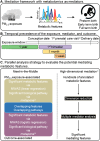Unraveling the Molecular Links between Fine Particulate Matter Exposure and Early Birth Risks in African American Mothers: A Metabolomics Study in the Atlanta African American Maternal-Child Cohort
- PMID: 40440123
- PMCID: PMC12164266
- DOI: 10.1021/acs.est.5c02071
Unraveling the Molecular Links between Fine Particulate Matter Exposure and Early Birth Risks in African American Mothers: A Metabolomics Study in the Atlanta African American Maternal-Child Cohort
Abstract
In the United States, African Americans (AA) are disproportionately exposed to elevated levels of ambient fine particulate matter (PM2.5) while suffering from the highest rates of early births. To elucidate the largely unknown underlying mechanism, we analyzed serum metabolomics from 330 participants in the Atlanta AA Maternal-Child Cohort and performed high-throughput mediation analysis to identify intermediate metabolites and pathways linking PM2.5 to early births. Energy-metabolism-related metabolites (carnitine and adenosine triphosphate), along with lysoPE(20:3) and acetylcysteine, were both associated with PM2.5 exposure and elevated early birth risks. Perturbations in protein digestion and absorption and aromatic amino acid (phenylalanine, tyrosine, and tryptophan) metabolism may potentially mediate the associations between PM2.5 and early births. We identified significant indirect effects of cortexolone (Proportion mediated: -11.8%) and lysoPE(20:3) (9.4%) in mediating the relationship between PM2.5 and early births. Our findings might aid in early birth prevention among AA communities by providing novel insights into the underlying biological mechanism.
Keywords: amino acid metabolism; early term birth; energy metabolism; environmental justice; fine particulate matter; high-dimensional mediation analysis; high-resolution metabolomics; minority health; preterm birth.
Figures





Similar articles
-
Maternal metabolomics linking prenatal exposure to fine particulate matter and birth weight: a cross-sectional analysis of the MADRES cohort.Environ Health. 2025 Mar 29;24(1):14. doi: 10.1186/s12940-025-01162-x. Environ Health. 2025. PMID: 40158186 Free PMC article.
-
Associations of air pollutants and related metabolites with preterm birth during pregnancy.Sci Total Environ. 2024 Nov 15;951:175542. doi: 10.1016/j.scitotenv.2024.175542. Epub 2024 Aug 14. Sci Total Environ. 2024. PMID: 39151621
-
Metabolic Perturbations Associated with an Exposure Mixture of Per- and Polyfluoroalkyl Substances in the Atlanta African American Maternal-Child Cohort.Environ Sci Technol. 2023 Oct 31;57(43):16206-16218. doi: 10.1021/acs.est.3c04561. Epub 2023 Oct 19. Environ Sci Technol. 2023. PMID: 37857362 Free PMC article.
-
Maternal fine particulate matter (PM2.5) exposure and adverse birth outcomes: an updated systematic review based on cohort studies.Environ Sci Pollut Res Int. 2019 May;26(14):13963-13983. doi: 10.1007/s11356-019-04644-x. Epub 2019 Mar 20. Environ Sci Pollut Res Int. 2019. PMID: 30891704
-
Ambient fine particulate matter and pregnancy outcomes: An umbrella review.Environ Res. 2023 Oct 15;235:116652. doi: 10.1016/j.envres.2023.116652. Epub 2023 Jul 13. Environ Res. 2023. PMID: 37451569
References
-
- Mehta A. J., Zanobetti A., Bind M. A., Kloog I., Koutrakis P., Sparrow D., Vokonas P. S., Schwartz J. D.. Long-Term Exposure to Ambient Fine Particulate Matter and Renal Function in Older Men: The Veterans Administration Normative Aging Study. Environ. Health Perspect. 2016;124(9):1353–1360. doi: 10.1289/ehp.1510269. - DOI - PMC - PubMed
MeSH terms
Substances
Grants and funding
LinkOut - more resources
Full Text Sources

